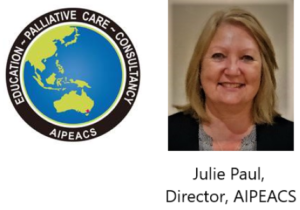
日本語訳監修: 木下佳代子 ジェックス参与
皆さんは素敵なイースターを過ごし、この時間を休息やリフレッシュに充てることができたでしょうか?
3月と4月の更新は、イースター休暇とオーストラリアでの休暇のため、統合されました。
今月は、すべての患者さんに聞いてみたい質問をひとつ考えてみたいと思います。 どんな質問をすれば、患
者さんのケアに違いが出るでしょうか? 何かアイデアはありますか?
“最高のケアをするために、私はあなたという人間について何を知る必要があるのでしょうか?”
ハーヴェイ・チョチノフ博士は、医療における尊厳とはどのようなものか、患者さんとの違いを数量化しよう
と、患者尊厳質問(PDQ)として知られる質問を紹介しました。 現在、この質問を検証するために多くの研
究が行われています。https://www.psychologytoday.com/intl/blog/cancer-survivorship/202303/the-one-
question-your-doctor-should-ask#_=_
。
この質問をし、その答えに耳を傾けるだけで、患者さんとの関係が瞬時に変わることを想像してみてください。
質問をすることに時間はかかりませんが、その答えに耳を傾け、患者さんが話した情報をサポートすることは、
患者さんと医療従事者の双方にとって非常に大きな力になります。 これは、患者中心のケアの真髄であり、
すべての患者さんに対するケアの尊厳を支えるものです。
次の28分間のビデオ「Dignity in Care」(https://dignityincare.ca/en)をぜひ聞いてみてください。 このビデ
オは、私たちがすべての患者さんにDignity in Careを確実に提供するための素晴らしい概要を示しています。
このビデオは、私たちがすべての患者さんに提供するケアにおいて、いかにして「尊厳」を確保するかという
重要な側面を思い出させるために、ABCDという頭字語を用いて素晴らしい概要を説明しています。 このビ
デオは、私たちがどのようにすればもっと良くなるのか、そして私たちのアプローチがどのように患者さん一
人ひとりに大きな違いをもたらすのかを思い出させてくれる素晴らしいものです。
A = Attitude(態度) – 患者さん一人ひとりにケアを提供するあなたの態度が、患者さん一人ひとりに大きな
影響を与えます。
B = Behaviour – 医療従事者の態度によってもたらされる行動。
C = Compassion(思いやり) – 他人の苦しみを理解し、喜んで関わろうとすること。
D = Dialogue = 会話 – すべての患者さんに問うべき質問 – 人としてあなたの何を知る必要があるのか?
https://dignityincare.ca/en/the-abcds-of-dignity-in-care.html
Dignity in Careについてもっと読みたいと思われた方は、興味深い情報がたくさんあるこの素晴らしいウェ
ブサイトをぜひご覧になってください https://dignityincare.ca/en/about-us.html
いつも通り、追加情報が必要な分野があれば、リクエスト(英語または日本語)を
julie@palliativeeducation.com までお送りください。
緩和ケアに関するあなたの考えや経験を共有し、互いに学び続けることができるよう、
あなたの状況をお知らせください。
来月のキャッチアップを楽しみにしています。 お元気で! ジュリーより
事務局より:
ジュリーさんは、皆様からの感想、質問などをお待ちしています。
-
Disclaimer: March/April 2023 免責条項:
Australian International Palliative Education and Consultancy Services (AIPEACS) は、Julie’s Update シリーズ内 -
の内容につき正確な情報の提供に細心の注意を注いでいますが、特にある事柄についての専門的意見を提供するもの
-
ではありません。このシリーズに含まれる情報は、独立した専門家の見解に取って代るものではありません。
-
また、医療上の助言として利用したり、何らかの疾患の治療、手当、又は、予防のために使用されるものではありません。
AIPEACSは、このシリーズにより提供される情報の利用、依存によるいかなる法的責任、怪我、紛失、損害については、 -
責任は負いません 。
Australian International Palliative Education and Consultancy Services Pty. Ltd -
Julie’s Update: March/April 2023 (原文) -
I hope you all had a lovely Easter and you were able to use this time to rest and refresh.
The March and April updates have been combined due to the Easter break and holidays in Australia.
-
This month I would like us to reflect on one question we could ask all our patients. What question
-
would make a difference to their care? Any ideas?
-
It has been proposed, we need to be asking the simple question,
“What do I need to know about you as a person to give you the best care possible?”
Dr Harvey Chochinov introduced the question known as the Patient Dignity Question (PDQ)
to attempt to quantify what dignity in health care looks like to difference patients. There have
been many studies now to validate this question.
Imagine how our relationship with the patient would instantly change if we simply asked
this question and listened to the answer.
Asking the question does not take time, however listening to the answer and supporting
the information the patient has told you, is very empowering for both the patient and the
health professional. It is the true essence of patient centred care and supports Dignity in Care
for all our patients.
I would encourage you to have a listen to the following 28 minute video, Dignity in Care
https://dignityincare.ca/en/the-abcds-of-dignity-in-care.html
The video provides a fantastic overview of how we can ensure we provide Dignity in Care
to all our patients and why it is so important.
-
The video provides a wonderful overview of using the acronym ABCD to remind us of the
-
important aspects of how we can ensure Dignity in the Care we provide to all our patients.
-
This is a great reminder of how we can do better and how our approach makes a huge
-
difference to each of our patients.
-
A = Attitude – your attitude to providing care to each patient has a profound effect on each
-
of your patients
B = Behaviour – behaviour that is informed by an attitude of the health professional
C = Compassion – understanding of the suffering of another and a willingness to be involved
D = Dialogue = the conversations – The question we should ask all patient – What do I need
-
to know about you as a person?
-
https://dignityincare.ca/en/the-abcds-of-dignity-in-care.html
If you are interested in reading more about Dignity in Care, I would encourage you to have a look
-
at this great website that has lots of interesting information
-
https://dignityincare.ca/en/about-us.html
- As always, if you have any particular areas you would like additional information on,
- please forward your request (either in English or Japanese) to julie@palliativeeducation.com
- and we will ensure this is discussed.
Please let me know how you are going as we would enjoy sharing your thoughts and
experiences on palliative care, so that we can continue to learn from each other.
I am looking forward to our next month’s catch up.
Take care, Julie
